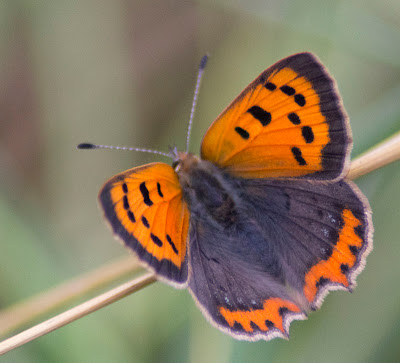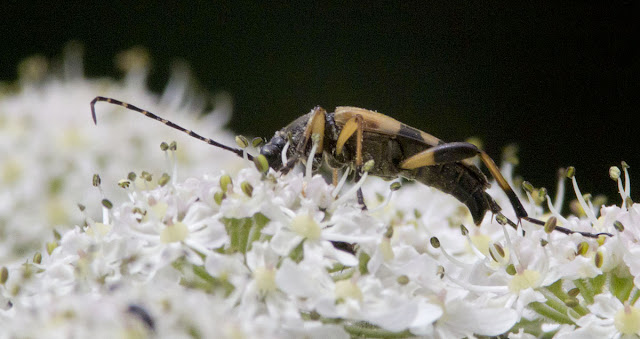 |
| Small Copper, Lycaena phlaeas. Darrick and Newstead Woods, 23 July 2011. |
There was only intermittent sunshine, but it warmed up a little as we went along. It was a good group, containing many of the Friends of Jubilee Country Park, and some faces I recognised from other groups, including Keith who led a Scadbury Park walk a few days ago.
The paths through the woods were very quiet and quite dark. But when we emerged into a meadow everything changed. They were full of colourful flowers, and soon we began to see butterflies.
One thing that struck me was that the people on this walk were focused. Butterflies were what the walk was for, and that's what they had come to see. Walking with, for example, the Orpington Field Club, everything was of interest to somebody. Here, there was only occasional interest in plants and other invertebrates.
 |
| Something different: a fly, Tachina fera, on Creeping Thistle, Cirsium arvense. Darrick and Newstead Woods, 23 July 2011. |
Several of us were checking out all the Ragworts we passed, to see if there were any Cinnabar caterpillars on them. There were none, in great contrast to Scadbury Park three days ago where they swarmed on almost every plant. I have also seen them on the Four Corners section of the Hayes Common SSSI.
At the end of the walk, Sue had a count of 53 butterflies of 8 species. That's not outstanding, but it's not bad for an unpromising day.
At the time I wasn't counting, but thinking back, I had seen many nice fresh Gatekeepers and tired Meadow Browns, an older Ringlet, an outstanding Small Copper, some Large Whites and a Green-Veined White, some Commas, some Small and Essex Skippers, a Small Heath, one very nice Brown Argus, a Speckled Wood, and a blue, probably a Common Blue, that flew away from us just as we were coming to the end of the walk. I make that 12 species, allowing for the fact that Small and Essex Skippers are counted together because they are so hard to distinguish. I do not know why Sue only had eight on her list.
I was using my EOS 60D with a 200mm lens and 2x extender again. This time I was trying a faster shutter speed, which successfully eliminated camera shake, but resulted in a smaller depth of field, more so when the sun was behind the clouds. Always there is a tradeoff .. I will try something different again next time, perhaps a higher ISO.
 |
| Gatekeeper, Pyronia tithonus. Butterfly walk in Darrick and Newstead Woods, 23 July 2011. You can clearly see the two white spots that distinguish this from a Meadow Brown, which has one white spot. |
 |
| Ringlet, Aphantopus hyperantus; rather faded. Butterfly walk in Darrick and Newstead Woods, 23 July 2011. Compare this with the fresh specimen in my post on Downe Bank a month ago. |
 |
| Green-Veined White, Pieris napi. Butterfly walk in Darrick and Newstead Woods, 23 July 2011. |
 |
| Finally, a longhorn beetle, Strangalia maculata, on Hogweed, Heracleum sphondylium. Butterfly walk in Darrick and Newstead Woods, 23 July 2011. |


You had a great day, by my standards. I suppose the small copper is really the prize, but I like a longhorn wading in hogweed or the comma from behind; while I adore Nabokov, I think that pinning down lepidoptera limits them awfully. Also the green-veined white with its fancy anteennae and the long-haired gatekeeper are glorious creatures. You have finally shown me why Nabokov liked lepidopgtera so passionately. Two days ago we lost another of my favorite geniuses, Lucien Freud, too. I am feeling older each day. But also a minor artist, yet one of the first designers (of so many album covers, even going back to 78rpm), Steinweiss, whom I'd have doubted might still be alive.
ReplyDeleteAs so often, omitted a part of a sentence: But we also lost a minor artist,...
ReplyDeleteI am glad you found some butterflies. So many have disappeared from our gardens now. xx
ReplyDelete